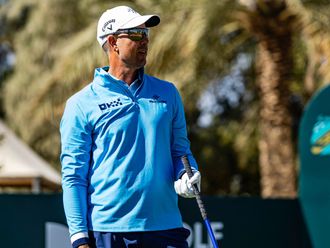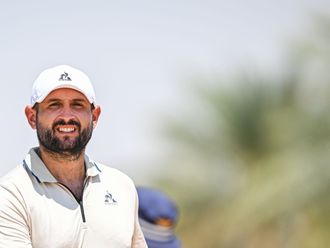Dubai: Kazuyuki Kyoya was on his way to a dress rehearsal for his wedding in November 1993 when a car crash left him paralysed from the chest down ending his fledging football career at the age of 22.
The midfielder had made just 13 appearances since joining JEF United Ichibara Chiba in 1990, but was on the cusp of a first team breakthrough during the J-League’s inaugural season of professionalism.
“It was dark, wet, I was driving too fast and I hit a pole, I don’t remember anything after that,” Kazuyuki, now 44, told Gulf News on the sidelines of the ongoing Eighth Fazza Wheelchair Basketball Tournament at Al Ahli this week, where he is now coach of event-favourites Japan.
He married his fiancée Yoko in hospital 11 days after the accident as he struggled to come to terms with the reality of never being able to walk again, let alone play football.
But it was a chance encounter with Japan’s then wheelchair basketball coach Osamu Kotaki that inspired him to take up an entirely different sport eight months after leaving hospital.
He went on to join the Chiba Hawks wheelchair basketball team and represented Japan at the last four Paralympic Games even captaining the side at Beijing in 2008, with his life-story becoming the subject of a 2009 film called ‘Parallel’ directed by Kazuaki Muto.
“I couldn’t accept not playing football anymore for a little while,” he added, but key to his reasons for bouncing back were his two children. “I didn’t want them to grow up being teased because I’m disabled. I wanted to do something that they could be proud of.
“I love sport, especially ball games and after the accident I needed something to get into. When I found wheelchair basketball I realised that this was it. There’s lots of contact and it’s not too dissimilar to football,” said the former point guard, who has also kept his love of football going on the side by completing his coaching badges.
Part of his need to continue in sport was for his own satisfaction as well, he admitted.
“When I played football I was still in the middle of a dream and hadn’t yet been successful. Once I had the accident I still wanted to do something to succeed and that’s what kept me going. I wanted to succeed in a dream that was like breaking into the J-League and making the Japanese national team.
“I felt closest to that dream with wheelchair basketball. Football was so competitive and it would have been very hard to make it, I also had the accident and almost gave up, but once I started wheelchair basketball I saw the dream was close again and that encouraged me to continue.”
Asked if he thought he could have gone on to make it as a footballer if it hadn’t been for the accident, he replied: “I think I would have become a big player if I had the mental strength I have now. But I only have that strong mentality because of the accident.”
He also implied that the accident had made him a better person as well as sportsman.
“I was a selfish player and wanted to change that. The accident made me notice all the bad points about myself and made me grow up.”










